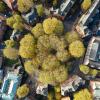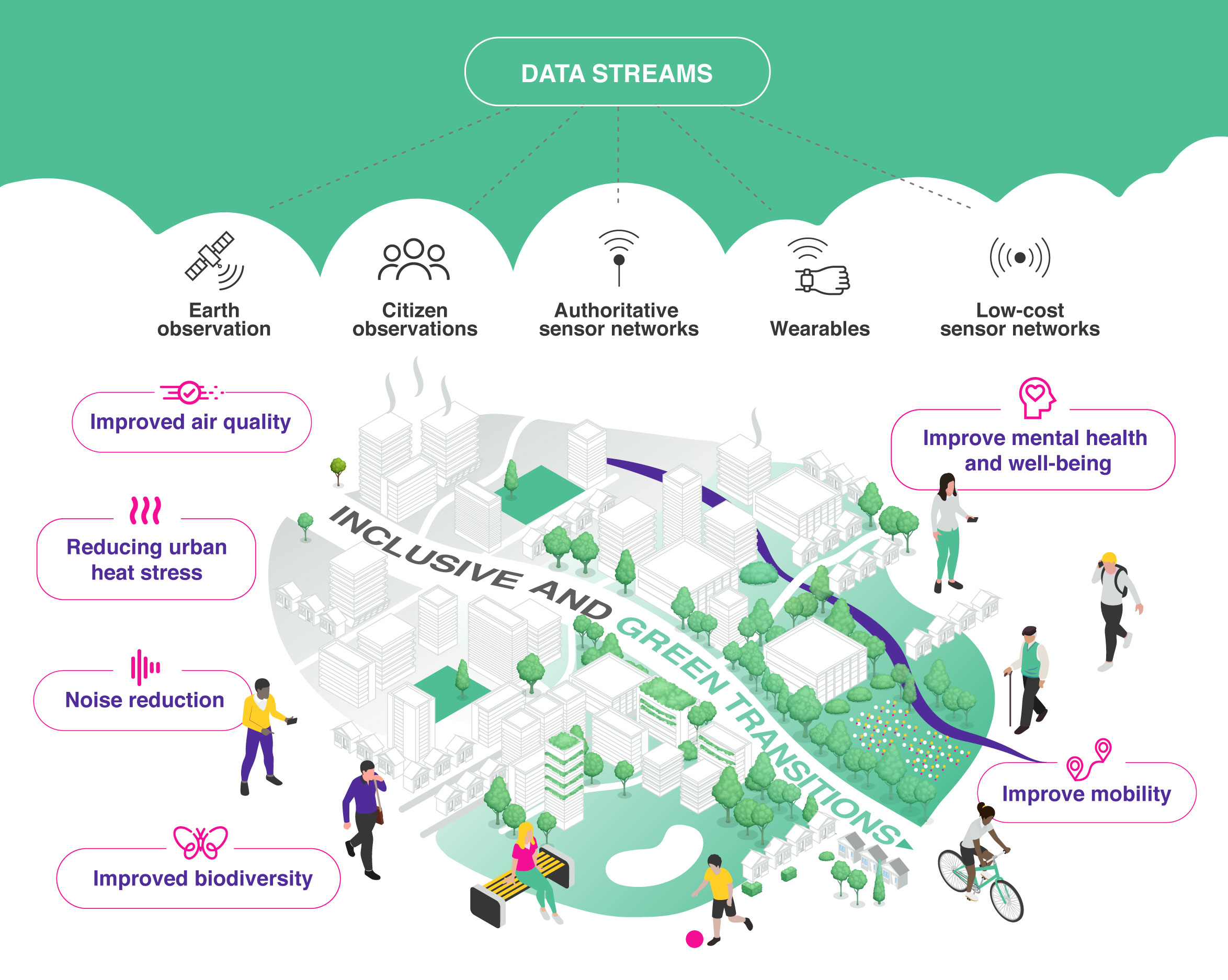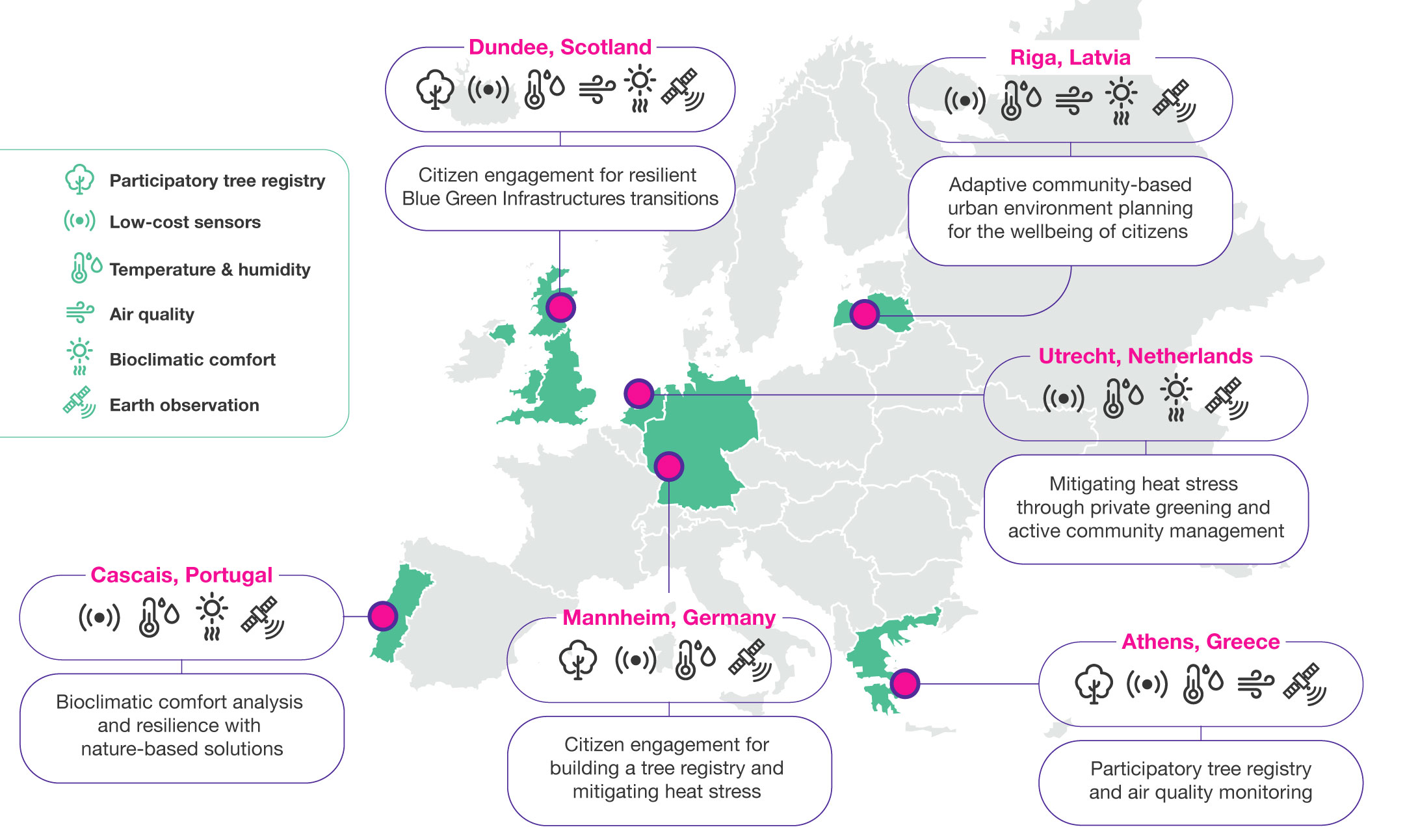
Urban ReLeaf delivers citizen-powered data ecosystems to support cross-sectoral innovation and political agenda setting for climate change adaptation and green infrastructure planning in urban environments.
We live in an urban century where by 2050, an estimated 2.4 billion more people will live in cities globally1. At the European level, urbanization is expected to increase from 72% in 2015 to 83.7% by 2050, while built-up areas are likely to expand by more than 3% between 2015 and 2030, reaching 7% of the EU territory2. Living in urban areas can have negative impacts on health and well-being. In the EU, some 85% of the urban population is exposed to fine particulate matter (PM2.5) at harmful levels to health1. Climate change will worsen the urban heat island effect, with forecasts of 150K deaths annually in Europe by 2100 due to more severe heat waves3. At the city level, access to greenspace varies across cities4, yet this is recognized as being important at the global level via SDG target 11.7 as well as the EU city mayors’ participation in the Green City Accord5.
Nature-based Solutions, such as the expansion of urban greenspace and planting of trees, can provide cooling effects, decrease air pollution, and improve mental health, among other ecosystem services and health-related benefits6. Various ambitious initiatives support this movement, e.g., the pledge to plant 3 billion trees in the EU as part of the New EU Forest Strategy for 20307, the European Green Deal, the BiodiverCities project8 and the Green City Accord5. At the same time, public authorities are challenged with finite resources to collect suitable data to inform their decision making.
To address this challenge, Urban ReLeaf will co-create citizen-powered data ecosystems to support climate change adaptation, green infrastructure, and urban design planning. Such Citizen Observatories focus on collective action, combining Earth Observation technologies with community-based environmental monitoring for delivering new data/information systems9.
At the heart of Urban ReLeaf’s action- and mission-oriented approach are public authorities and established communities and citizen groups in six pioneering Urban ReLeaf cities: Athens, Dundee, Utrecht, Cascais, Mannheim and Riga. Each city has outlined substantial opportunities for citizen-centric innovation paving the way for improved, participatory, and data-driven decision making.
Urban ReLeaf emphasises critical information gaps and barriers to urban greening efforts and delivers a series of civic engagement and monitoring campaigns to overcome the gaps, and offering protocols for the uptake, validation, and long-term inclusion of citizen-powered data into authoritative data streams. The project tackles local issues of public interest and contributes to European and global policies, while strengthening EU environmental monitoring mechanisms such as Copernicus and the Global Earth Observation System of Systems (GEOSS).
Urban ReLeaf will showcase the democratisation of urban greenspace monitoring and the wider policy making process for cities in pursuit of urban climate resilience. The Urban ReLeaf data ecosystem and associated governance models will deliver new, inclusive pathways in support of the European Green Deal and Sustainable Development Goals keeping cities resilient, liveable, and accessible for all.
Project Partners:
- International Institute for Applied Systems Analysis (coordinator)
- Vrije Universiteit Brussel
- Institute of Communication and Computer Systems
- CIBOS Innovation Idiotiki Kefalaiouchiki Etaireia
- ICLEI European Secretariat GmbH
- University of Dundee
- Ethniko Asteroskopeio Athinon
- Collecte Localisation Satellites
- Dimos Athinaion Epicheirisi Michanografisis
- Dundee City Council
- Gemeente Utrecht
- Provincie Utrecht
- Empresa Municipal de Ambientede Cascais
- Stadt Mannheim
- Riga Planosanas Regions
 © European Commission
© European Commission
Urban ReLeaf is a Horizon Europe Innovation Action under the Topic: CL6-2022-Governance-01-08 - Uptake and validation of citizen observations to complement authoritative measurement within the urban environment and boost related citizen engagement.
References
- McDonald, R. I., Beatley, T. & Elmqvist, T. The green soul of the concrete jungle: the urban century, the urban psychological penalty, and the role of nature. Sustain Earth 1, 3 (2018).
- EC. Developments and Forecasts on Continuing Urbanisation Foresight. https://knowledge4policy.ec.europa.eu/foresight/topic/continuing-urbanisation/developments-and-forecasts-on-continuing-urbanisation_en. (n.d.).
- Forzieri, G., Cescatti, A., e Silva, F. B. & Feyen, L. Increasing risk over time of weather-related hazards to the European population: a data-driven prognostic study. The Lancet Planetary Health 1, e200–e208 (2017).
- Poelman, H. A walk to the park? Assessing access to green areas in Europe’s cities. Update using compuleted Copernicus Urban Atlas data. (2018).
- European Commission. Green City Accord. https://ec.europa.eu/environment/green-city-accord_en. (2020).
- Kingsley, M. & EcoHealth Ontario. Commentary - Climate change, health and green space co-benefits. Health Promot Chronic Dis Prev Can 39, 131–135 (2019).
- European Commission. The 3 Billion Tree Planting Pledge For 2030. https://ec.europa.eu/environment/pdf/forests/swd_3bn_trees.pdf. (2021).
- JRC. BiodiverCities: A roadmap to enhance the biodiversity and green infrastructure of European cities by 2030. https://publications.jrc.ec.europa.eu/repository/handle/JRC125047. (2021).
- Hager, G. et al. Onto new horizons: insights from the WeObserve project to strengthen the awareness, acceptability and sustainability of Citizen Observatories in Europe. JCOM 20, A01 (2021)
News

08 December 2023
Urban ReLeaf at COP28

25 January 2023




